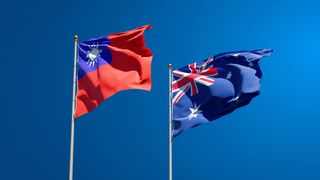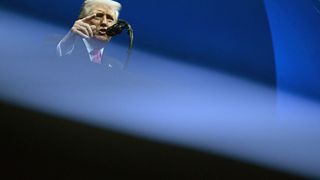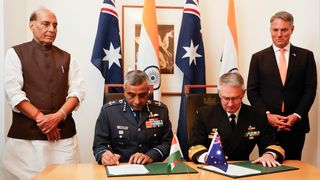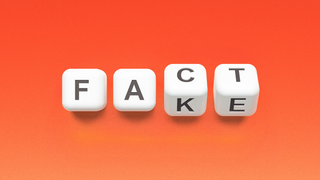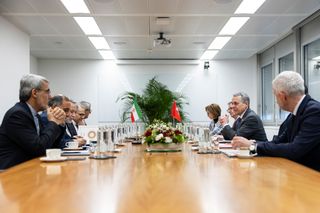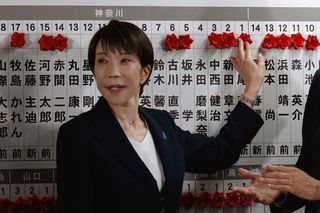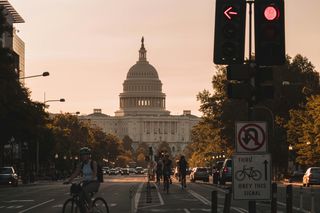The US and Ukraine are due to sign a "preliminary" critical minerals deal—but what does it actually mean? Director of Economic Security Hayley Channer breaks down the real implications, from long-term viability to the geopolitical push to reduce reliance on China. She explains why this deal won’t yield immediate benefits, how Australia fits into the rare earths supply chain, and why this move might be more symbolic than economic for the BBC.
Transcript
BBC anchor: Well, let's speak to Hayley Channer, Director of Economic Security with the US Studies Centre at the University of Sydney. Haley Channer, welcome to you. What do you make of this deal? What's in it for the US?
Hayley Channer: Well, great question. In fact, I think what we will find is that in the immediate term, there's not a lot in it in terms of actual critical minerals and rare earths. Maybe there's something in terms of bringing a faster end to the conflict in terms of negotiating between Ukraine and Russia. But what you need to understand about critical minerals and rare earths is that you have to do a lot of work to get them out of the ground, and if you want to get them out of the ground, it has to be commercially viable. You need actual people from the private sector who see value in it. So when you think about it, a normal mine takes between a decade and 18 years to get up and running. And what we know about Ukraine's critical minerals is that the last time they were surveyed was anywhere between 30 and 60 years ago by the Soviet Union. So a number of things would have to happen to actually get value out of this critical minerals deal for the United States. You would need to map where the critical minerals are. You'd need to establish the mines and you would need to establish offtake agreements. And so the actual tangible benefits to the US wouldn't be felt under Trump. They wouldn't even be felt under the next president. It would be even the president after that, where the US and US companies could actually start to extract these minerals if it was determined that it was commercially viable to do so.
BBC anchor: Right. So we're not even talking short term or medium term. It could even be long term. This the payoffs for this deal. Hayley, I wanted to ask you about the fact that there are many countries who are uncomfortable with the reliance on China, that there is for these kinds of minerals. And do you think that's one of the motives here?
Hayley Channer: That's exactly right. Donald Trump's very interested in rare earth elements. That's because they go into everything because they have magnetic qualities. So they go into things like your iPhone, your computer, your television, your refrigerator, your EV car, EV batteries. But they also go into high tech defence equipment. And the United States is currently 100% reliant on China for its rare earth elements. So this explains why Donald Trump is looking at other countries like the Ukraine, like Australia, even like Greenland, because Greenland has these mineral deposits to help reduce China's monopoly and give the United States more options in its supply chains. So in case China decides to stop selling rare earth elements to the United States, the US has some other options and other partners it can turn to.
BBC anchor: Just one more question for you, Hayley. It's about Australia, where you are. It has a lot of these minerals, these critical elements and critical minerals. It has deals in place. How are they working and who's benefiting?
Hayley Channer: Great question. I think Australia definitely wants to show that it's valuable to the United States. And it sees over the next four years with President Trump that Australia will need to make deals with President Trump. We've been very lucky recently in the sense that Australia is one of the only countries that has a surplus with the United States in our trade relationship and so we are trying to negotiate an exemption from steel and aluminium tariffs, but we're also trying to do some deals with the US on our rare earth elements. Under the Biden administration we tried that through climate change because rare earth elements go into things like wind turbines and solar panels. In this instance, we know that President Trump's much more interested in hard power and things like defence applications. So I can imagine the Australian Government thinking in those terms and couching our mineral assets in defence and strategic terms to really clinch a deal with Trump.
BBC anchor: Just looking, we've got a bit more time than we thought, Hayley, so just one more question for you actually. So you mentioned that this could be a long time, even before it's properly investigated. What kind and to what extent Ukraine even has these minerals. Just tell us about the sort of I mean, it's very hard to speculate, but the sort of the size of the deal, potentially the size of of the benefits that could be reaped in financial terms.
Hayley Channer: It's really impossible to say because we don't know what quality of critical minerals Ukraine has. And all of this is obviously determined by the market when you think about it. China invested very heavily in Indonesian nickel. It tanked the price of nickel globally and Australian nickel prices dropped. And in fact, Australian nickel smelters closed and we lost a lot of jobs. So there's a lot of fluctuations in this market. The reason why it's not like oil or gas, which, you know, you can actually see what the prices are doing, is because these minerals are sold in such small, minute quantities that you really can't have the transparency you have for other fossil fuels, for instance. So I wouldn't think of this deal in monetary terms. I would actually think of it as though Trump's trying to show the American public that he is doing a deal for them, and recouping some of the billions of dollars that the US has spent. It spent US$66 billion supporting Ukraine militarily and in total about US$174 billion.
BBC anchor: Which is sort of what he's talking about. He's been mentioning $350 billion, hasn't he?
Hayley Channer: Yes. In fact, or $500B with an opening negotiating position. So it is sort of trying to show that the US is getting something out of the aid that it's given. But Americans are also struggling financially and needing to transition to a new economy. And so he's trying to show them that he's bringing back some value to Americans. So I wouldn't think about it in terms of actual monetary value anytime soon. It's more symbolic.
BBC anchor: Okay, Hayley, we were delighted to have more time than we thought with you, Hayley. Thank you very much. Director of Economic Security with the US Studies Centre at the University of Sydney. Thank you.







